 Petzlover
Petzlover Chow Chow is originated from China but Puggle is originated from United States. Chow Chow may grow 13 cm / 6 inches higher than Puggle. Chow Chow may weigh 19 kg / 42 pounds more than Puggle. Both Chow Chow and Puggle has almost same life span. Both Chow Chow and Puggle has almost same litter size. Chow Chow requires High Maintenance. But Puggle requires Moderate Maintenance
Chow Chow is originated from China but Puggle is originated from United States. Chow Chow may grow 13 cm / 6 inches higher than Puggle. Chow Chow may weigh 19 kg / 42 pounds more than Puggle. Both Chow Chow and Puggle has almost same life span. Both Chow Chow and Puggle has almost same litter size. Chow Chow requires High Maintenance. But Puggle requires Moderate Maintenance
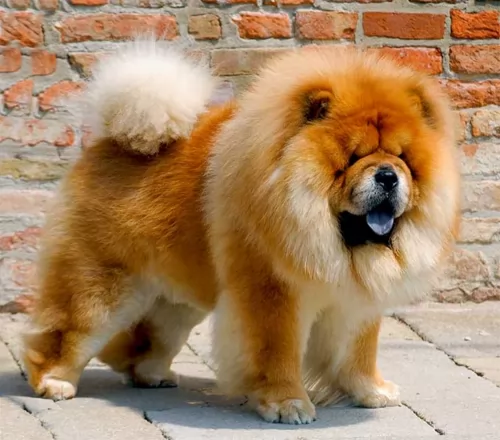 Northern China is the original home of the Chow Chow. In that region of China, the breed was known as the Songshi Quan – “the puffy-lion” dog. They have also been known in China as the “Dog of the Tang Empire” or the Tang Quan. The Chow is believed to be an ancient breed that the Foo Dog, or stone dog guardians of Buddhist palaces and temples, is modeled after. It is one of the most ancient of dog breeds that are still around today.
Northern China is the original home of the Chow Chow. In that region of China, the breed was known as the Songshi Quan – “the puffy-lion” dog. They have also been known in China as the “Dog of the Tang Empire” or the Tang Quan. The Chow is believed to be an ancient breed that the Foo Dog, or stone dog guardians of Buddhist palaces and temples, is modeled after. It is one of the most ancient of dog breeds that are still around today.
It is believed that they have existed for around 2000 years or perhaps even as far back as 3000 years, starting out in Mongolia and migrating to China. The ancientness of the Chow Chow has been validated through DNA testing. In China all those centuries ago, the Chow Chow was born to be a working dog. They hunted, herded, guarded and pulled carts. They went on quests with the Mongolian armies when China was invaded, as well as when the Mongolians invaded the Middle East and Europe later on.
Today’s Canadian Kennel Club has about 350 Chows registered while the AKC gets 10,000 new registrations every year.
 The first Puggle was bred in the United States in the 1980s and was registered with the American Canine Hybrid Club.
The first Puggle was bred in the United States in the 1980s and was registered with the American Canine Hybrid Club.
None of the major kennel clubs recognize Puggles as a dog breed. The Puggle is a mix between the Pug and the Beagle, and is essentially a companion dog. Both the parent dogs are popular pets and each of the dogs - the Pug and the Beagle have their own histories.
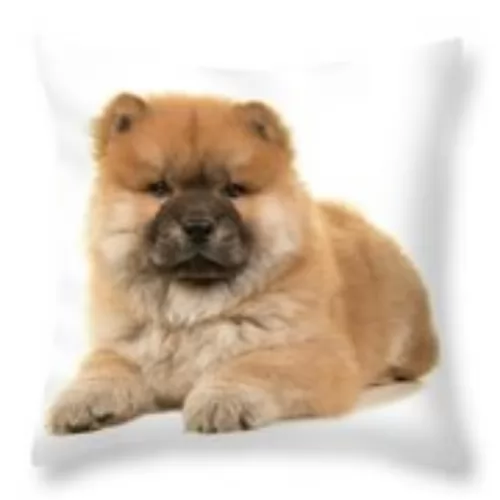 The Chow really does look like a small lion with a black tongue. The dog is sturdy and square with erect, small ears on a broad skull. They have a very dense double coat. Their eyes are deep set and look like almonds, while they all have that very distinctive purple or black tongue. Their lips are also distinctive with their blue color. The nose is black, but some Chows might have a blue nose. The tail is curly.
The Chow really does look like a small lion with a black tongue. The dog is sturdy and square with erect, small ears on a broad skull. They have a very dense double coat. Their eyes are deep set and look like almonds, while they all have that very distinctive purple or black tongue. Their lips are also distinctive with their blue color. The nose is black, but some Chows might have a blue nose. The tail is curly.
These are medium size dogs when it comes to height and weight, but they are powerfully built for their size. Their power is in their compact body holding the energy and strength of a much larger dog. Its hind legs are almost entirely straight, unusual for any dog. They get their lion appearance from the huge ruff that stands behind their heads. Their chest is broad and deep.
 The Puggle isn’t a purebred and he has short legs, a fairly thickset body, a crooked tail and medium length, floppy ears.
The Puggle isn’t a purebred and he has short legs, a fairly thickset body, a crooked tail and medium length, floppy ears.
The Puggle’s coat is short and smooth and the colors can be anything between fawn, white, tan with bi-coloring such as black and white or even tri-colored such as white, black and tan.
He may have the black mask like the Pug has or he may not. He stands in height between 25-38cm and weighs between 4 and 13kg.
The Puggle brings fun and games into every household with his bright, sociable personality. He gets on well with children and other dogs and makes a splendid pet and friend.
He is intelligent, albeit a bit stubborn too, but you can teach him some simple commands such as sit, stay and lie down. They are dogs which can adapt well to life in the city or in the countryside.
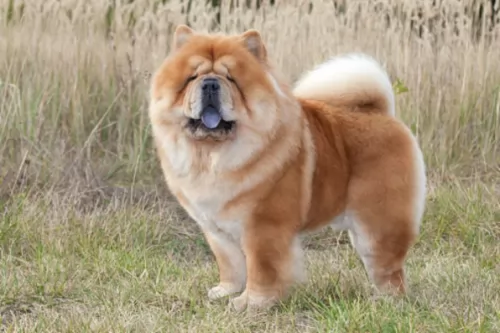 Loyal and true to their family and those they know; the Chow Chow is a little standoffish with strangers. They are very protective and usually attach themselves to one or two people. They are intelligent but stubborn, which can affect your training with them. They need to respect their people and Chows respect hose who take care of them. They can be aggressive toward dogs of their same sex especially if those dogs are the same breed as well.
Loyal and true to their family and those they know; the Chow Chow is a little standoffish with strangers. They are very protective and usually attach themselves to one or two people. They are intelligent but stubborn, which can affect your training with them. They need to respect their people and Chows respect hose who take care of them. They can be aggressive toward dogs of their same sex especially if those dogs are the same breed as well.
They are known to be very clean and many have compared them to cats in that regard. They appear to be dignified and refined. They are usually very quiet but very adaptable dogs.
 Puggles are lively dogs who are always up for a game. They are affectionate and loving towards their human family and get on well with strangers too.
Puggles are lively dogs who are always up for a game. They are affectionate and loving towards their human family and get on well with strangers too.
They’re the kind of dogs who love a game outside but then are more than happy to cozy up on the couch with you.
Puggles love the attention of their family members and in exchange for your attention he is willing to shower you with his companionship and devotion.
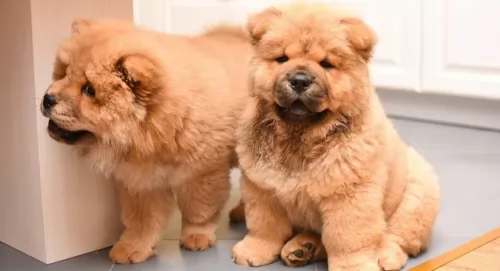 Although an ancient breed that obviously has survived many centuries of trials, the Cho Chow of today is prone to several different health conditions. These include:
Although an ancient breed that obviously has survived many centuries of trials, the Cho Chow of today is prone to several different health conditions. These include:
This condition can require surgery to keep the turning eyelid from injuring the eye ball.
This can cause lameness and arthritis.
This can cause lameness and arthritis.
Make sure you keep the ears clean and keep an eye on them.
 Your Puggle isn’t likely to get sick often if you feed him healthy food, you exercise him and provide him with a loving, caring home. However, every dog can become ill, and Puggles can battle with the likes of Cherry Eye, skin problems and Hip Dysplasia among other ailments too.
Your Puggle isn’t likely to get sick often if you feed him healthy food, you exercise him and provide him with a loving, caring home. However, every dog can become ill, and Puggles can battle with the likes of Cherry Eye, skin problems and Hip Dysplasia among other ailments too.
Because of the Pug being a brachycephalic breed, your Puggle might also battle with respiratory problems.
Hip Dysplasia is a common canine disease that has no respect for age or breed of dog. Even young dogs can develop this heritable condition where the thighbone doesn't fit properly into the hip joint. Dog have pain in one or both of the rear legs, and can become totally lame. Arthritis can also develop.
This is when the gland in the dog’s third eyelid bulges out as a red mass. It can be treated surgically.
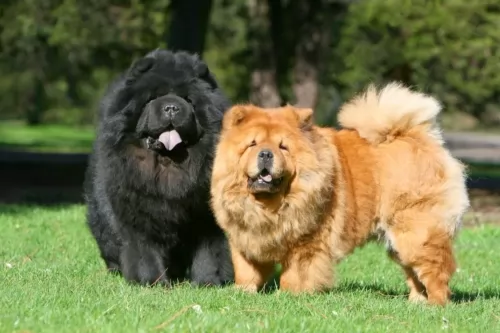 Don’t overfeed a Chow Chow as they are hard workers and big eaters. Feed them at least twice a day.
Don’t overfeed a Chow Chow as they are hard workers and big eaters. Feed them at least twice a day.
This eye disease can lead to blindness if not checked and treated.
These can be removed from an adolescent puppy.
Again, the Chow is susceptible to cancer.
Can lead to heart or kidney problems if left untreated.
Keep a close eye on your Chow Chow skin.
The Chow Chow was developed as working dog, but today’s version is more laid back and doesn’t need excessive exercise. Daily walks will suffice. They live very happily in the city if walked regularly. They are not really a competitive breed outside of obedience and confirmation. They are seldom seen in sports like agility or frisbee.
 The Puggle can settle into life in the city or the countryside as he doesn’t require too much exercise. That doesn’t mean however that you can just ignore his exercise needs, as doing so can make him overweight and unfit.
The Puggle can settle into life in the city or the countryside as he doesn’t require too much exercise. That doesn’t mean however that you can just ignore his exercise needs, as doing so can make him overweight and unfit.
Take him for walks and play games with him indoors as well as outdoors.
The Puggle, with his short-haired coat, is a low maintenance dog that is easy-to-groom. A good brush twice a week will be excellent for him.
A brushing session gives you a chance to look inside his ears for signs of redness and ear infections, to look at his eyes and have a good look inside his mouth. Bad teeth can cause pain but can also cause illness throughout the body.
Trim your dog's claws as well, because left too long they can hook on things and rip the flesh.
Our canine children rely on us for good food to stay healthy. Luckily, for convenience sake, there are excellent commercially manufactured dog foods on the market. The best ones ensure that your dog gets a good balance of vitamins and minerals.
However, you want to also provide your pet with some tasty home-made food too. Dogs thrive on simplicity and consistency, and home-cooked food twice a week and added to the dry kibble can keep him healthy and thrilled with his lot.
Boiled chicken, sweet potatoes, brown rice or pasta, carrots and spinach will be excellent for him – it is simple just as he likes it and it is nutritious. Chop the food up finely and add it into the dry kibble. Also, your Puggle will do well on some raw meat occasionally too as this keeps the skin free of rashes and free of infections.
Make sure he is never without a constant supply of fresh, cool water.